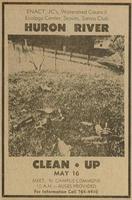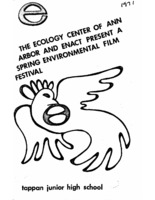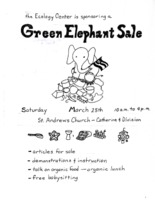1. Building an Environmental Community
To build an environmental community, the Ecology Center first needed to spread environmental concern throughout Ann Arbor. In an interview with the Michigan Daily, Fred Kingwill, a member of ENACT, explained how ENACT and the Ecology Center approached their work: “Our basic concept is you go through several steps before taking environmental action. You have to go through awareness to concern and then leap the final hurdle that leads from concern to action… Our goal is to push for a better world.” These events and initiatives are examples of many others the Ecology Center held in the 1970s. Through them, the Center brought environmental awareness to the community, turned awareness into concern, and provided ways for those who were concerned to take action in the push for a better world.
Huron River Clean Up
Two months after the Teach-In on the Environment, ENACT and the Ecology Center collaborated with the Ann Arbor Jaycees, the Huron River Watershed Council, the Boy Scouts, and the Sierra Club to clean up the Huron River. In spite of chilly weather, nearly 250 volunteers showed up on May 16, 1970. The volunteers combed a 21.5 miles stretch of the Huron River and collected approximately 400 cubic yards of trash. To put that into perspective, according to the Ann Arbor News reporter Doug Fulton, they collected in one day more than a quarter of what the city would pick up from its parks in a year. Some volunteers walked along the riverbank while some paddled down the river in canoes donated by the city, collecting garbage as they went.
In the Ecology Center’s first annual report, Director Bill Kopper described the significance of clean up events like this one. “Clean ups sponsored by the Ecology Center have helped teach people that forest areas are something more than garbage dumps and have united concerned citizens in an effort to achieve a quality environment.” In the years to come, clean-ups of nature areas in and around Ann Arbor would become a regular part of the Ecology Center’s programming.
Environmental Film Festivals
The Ecology Center sponsored environmental film festivals in the early 1970s to introduce a wide variety of ecological issues to the public. The first festival occurred in July 1970 during the week of the Ann Arbor Art Fair. Held in the Architecture & Design Auditorium at the University of Michigan, the festival featured 25 films and presentations in four days. The films that the festival screened ranged from nationally-known films like “Who Killed Lake Erie,” which portrayed the consequences of water pollution, to shorter films about city planning, population growth, and the scale of America’s solid waste problems. The Ecology Center also sponsored an environmental film workshop with the University of Michigan, which brought thirty students from across the state to show films they had created on topics like glass recycling, pollution in Ann Arbor creeks, and preventing oil slicks in the Great Lakes.
ENACT and the Ecology Center sponsored another film festival in 1971. Each Wednesday night in April, the festival screened films at Tappan Junior High School. The films awakened viewers to national environmental problems, including air pollution, overpopulation, and environmental crises in Nevada and Florida. Screening these films is one way the Ecology Center cultivated environmental concern by connecting local issues to broader patterns.
Green Elephant Sale
With its first Green Elephant Sale on March 25, 1972, the Ecology Center hoped to “show people that recycled items should be seen in a new light. Instead of ‘throw away this junk’ we hope to get people thinking along the lines of ‘what can I do with this?’” At St. Andrew’s Episcopal Church, crafters sold items made from recycled materials, like tin cans, newspapers, and plastic bottles. The day also included an organic lunch and workshops on making jewelry and soap, as well as craft projects for smaller children made from recycled objects. The Green Elephant Sale was one way the Ecology Center encouraged the community to think about how they could apply the lessons of ecology in their everyday lives.



